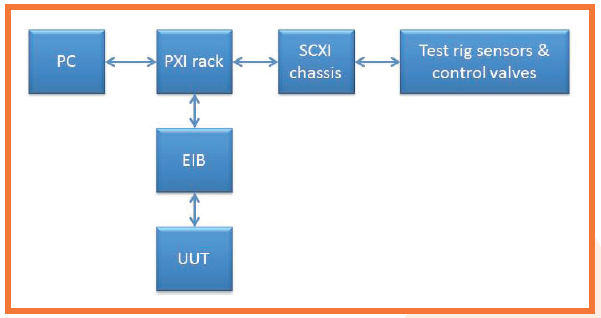Develop and Commission a Fully Automated Test Rig for Fuel Metering Units

Benefits for the business as a result of delivering this solution include:
- Decreased testing time of the automated system compared to the existing manual process
- Easy access to test results and data for any test and any FMU tested on the rig (previously no data was available)
- Implementation of the latest technology with regards to communication with the unit
- The new software system is structured so that it is both scalable and easy to maintain
- Extended the capability of the rig to test additional Fuel Metering Units (FMUs)
Background to the project
Our client manufactures aircraft engine components for engine manufacturers such as Rolls Royce. Their requirement was to develop and commission a fully automated software application as part of a rig for testing FMUs to ensure that they comply with the operating standards required.
Solution Overview
The test rig is a simulation of the fuel supply circuit within the aircraft engine. This includes an Electronic Interface Box (EIB), containing custom electronic, which simulates the aircraft electronic fuel control system.
The aim of the test rig is to perform a series of tests by setting flows, pressures, temperatures etc. and checking the performance of the FMU for compliance with a test schedule.
To implement the automation we had to understand and interpret each test in the schedule associated with the FMU. This involved building a sequence of states to execute for each test and constructing a queue driven state machine to handle each state.
One of the more complex states performs a shutdown procedure on the unit, simulating the pilot shutting down an engine during flight. This involved sending commands to the EIB application via TCP/IP to shut various valves within the unit and acquiring data whilst doing so. Following completion of the shutdown procedure the acquired data is analysed to determine the speed of shutdown in comparison to test limits.
A very important aspect of the project was to log data and results from each test as it was performed. This meant implementing a template previously designed by the client. Argenta staff had to ensure the data was captured at the right time and saved in the location related to the unit being tested, to manage traceability.

“Argenta staff are highly qualified for introducing new testing software and they have a very good understanding of our requirements. As usual when working with Argenta, the project was finished on time and on budget and we were well informed throughout about the progress of the work.”
AR,
Mechanical Test Transformation manager for aircraft engine supplier
Solution in detail
The diagram below details the layout of the control system:

PC – This is running the LabVIEW applications developed by Argenta for communicating with the NI hardware, the EIB and Test Rig control system using the following methods:
- Read data from the SCXI chassis via shared variables
- Send commands to the UUT via the EIB using TCP/IP
- Run through an automated test sequence to complete a unit test
PXI rack – communicates with the SCXI chassis via a PCI express data acquisition card. The interface with the FMU is achieved via the EIB using FPGA cards in the PXI rack.
SCXI chassis – This provides the interface between all signals from the pressure transmitters, flow meters etc. within the rig. It also outputs control signals sent from the LabVIEW application to the control valves.
One of the challenges we had to overcome was that the existing EIB was not capable of handling the signals from the range of FMUs the rig was intended to handle. Overcoming this meant working closely with the electronics team to validate changes to the EIB and ensure the signals were received by our LabVIEW application without affecting their integrity.
Back to Case Studies